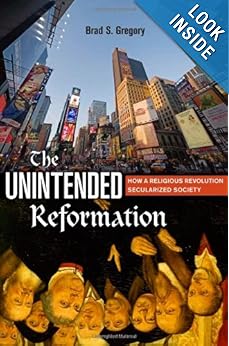About Me
Followers
Powered by Blogger.
Sunday, June 30, 2013
Book Review: The Unintended Reformation
Every so often a book scrambles the ways people look at
history, culture, society, economics, politics and church. Brad S. Gregory’s The Unintended Reformation is such a
book. Gregory, a professor of early modern history at Notre Dame, argues in six
long chapters and a conclusion, that the secular society in which we
increasingly live is the unintended by-product of the Reformation.
Gregory hits ideological capitalism particularly hard as a
product of secularism, made possible by the exile of Christian faith from
public life, and whose value of acquisitiveness rejects the historic Christian
critique of avarice and greed.
Academia comes under scrutiny for its belief in knowledge
for knowledge sake, rather than articulating a vision for social virtues, and
educating students to that end. I noted that the Goshen College emphasis on “building
the world peace by peace” is a delightful contrast.
 Gregory claims the church has either been banished from the
social and political realm, or has withdrawn willingly in order to survive, as
has happened in our own tradition. The modern secular nation state is left,
unaccountable to higher authority, with no resources to fashion an ethic of
good (that is a standard for what a flourishing human community might be, such
as shalom), but rather has emphasized an ethic of human rights. Ironically, the
latter has roots in the biblical understanding of human beings in God’s image,
even as secular states reject the bible as a source for shaping public life.
Gregory claims the church has either been banished from the
social and political realm, or has withdrawn willingly in order to survive, as
has happened in our own tradition. The modern secular nation state is left,
unaccountable to higher authority, with no resources to fashion an ethic of
good (that is a standard for what a flourishing human community might be, such
as shalom), but rather has emphasized an ethic of human rights. Ironically, the
latter has roots in the biblical understanding of human beings in God’s image,
even as secular states reject the bible as a source for shaping public life.
Modern secular states control the church, and define the
scope of its power and authority in public life. Churches are accountable to
it, not the other way around. The church does not get to decide whether or when
the state may go to war or use lethal force, but the state may demand that the
church and its members participate and respect its institutions of violence.
The secular state has domesticized faith.
Gregory is an equal opportunity offender, and every thinking
reader will take issue with some aspect of a book whose scope is so grand. The
book has been reviewed widely, with diverse opinions. For all, though, it is a
book to be reckoned with, and will
scramble ways of seeing for every reader.
Friday, June 21, 2013
Why I am a Mennonite, Part 2
Why I am
a Mennonite, Part 2 (Part 1 appeared in the CMC Newsletter recently)
Why am I
a Mennonite? One answer is, because of my family heritage. The name Waite looks
afar at the Germanic names which fill the Mennonite world and form the building
blocks of the Mennonite game. But I am claiming Mennonite heritage.
Joe
Springer, as Jonathan's mentor, as well as archivist and genealogist, has
unearthed our family ancestry, both Beth's and mine. Her book is thin, and she
seems to be a cousin to half College Mennonite Church. My book is thick and I'm
related to no one at College Mennonite.
I am
watching Mennonite life from the outside at times. Yes, I am a leader in the
Mennonite Church. Yes, I have been a Mennonite pastor for 14 years. Yes I have
half a dozen Mennonite institutions in my past. Still, my experience is that of
the in-law at a family reunion, struggling to comprehend the unwritten rules,
navigating a peculiar culture with its own set of values, customs and
practices. To be clear, the work of finding my place in this family is mine,
but I appreciate help wherever I can get it.
In his
excavation of Jonathan's ancestry, Joe gives me a great gift, and a new window
on why I am a Mennonite. It's my heritage. Perhaps I am Mennonite by heritage
as much as Beth, or any Bontrager, Friesen or Yoder. Joe's digging in the Waite
family garden reveals an ideal genealogical ecology for a Mennonite minister to
sprout and grow.

RogerWilliams, Anne Hutchinson and Mary Dyer (above, at the gallows), 17th century pioneers in religious
freedom, are 11x great grandparents. Thomas Frazier, anchor of five generations
of Quaker abolitionists is a 4x great grandfather. BD Austin, a circuit writing
Cumberland Presbyterian preacher in Texas, is a great great grandfather. Methodist
pastor Charlie Brown is a great grandfather, and his namesake, my father Chuck,
is ordained in the Wesleyan Holiness tradition. This eclectic mix of Christians
wrestled with issues of peace and justice, religious freedom, the relationship
of church and state, how to build Christian community, and how to live
faithfully in challenging circumstances.
My unique
Mennonite genealogical ecology now joins the many Mennonite genealogical
ecologies at College Mennonite Church, strengthening, broadening, changing it
as each of us do when we join this body. In particular, the genealogical
ecology of my ancestors is united in marriage, and in the flesh and blood of
two boys, with a genealogical ecology, fertilized with the stories and lives of
16th century Swiss Anabaptists and their descendants.
Subscribe to:
Posts (Atom)
